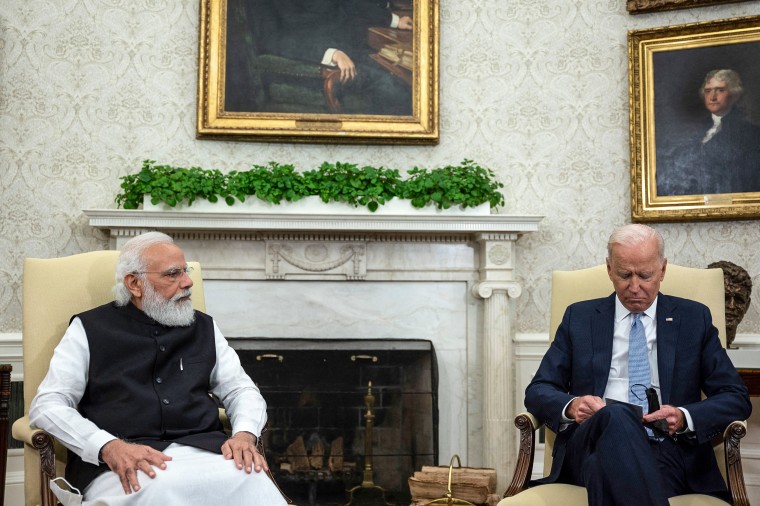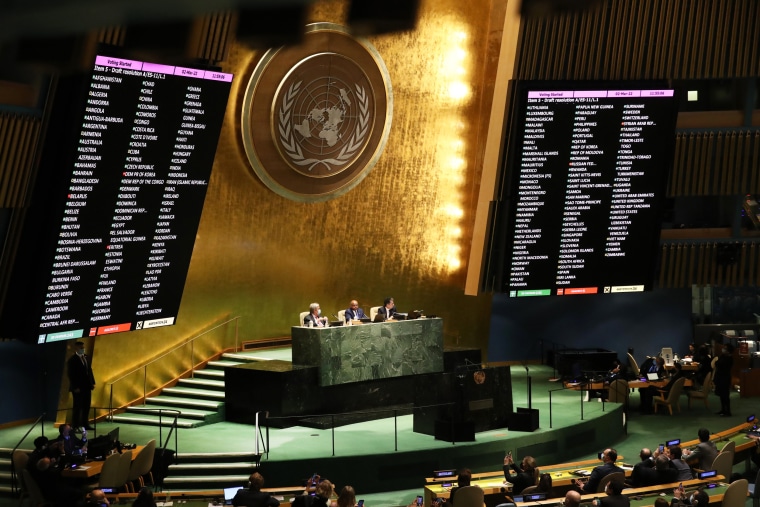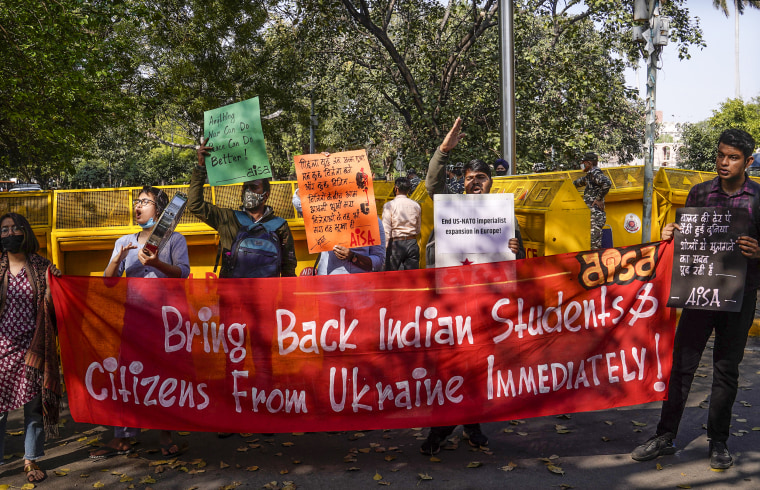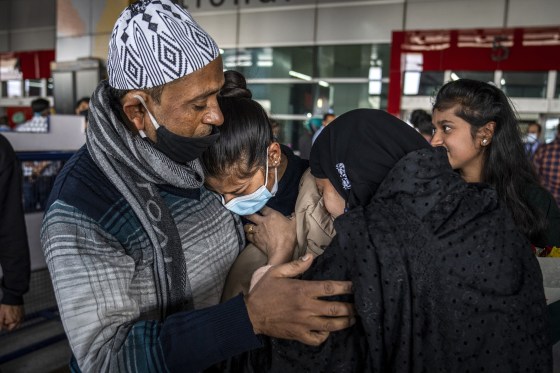WASHINGTON — As most of the world joins together to condemn Russia’s invasion of Ukraine, one holdout stands out: India.
The world’s largest democracy and one of its fastest growing economies is a key ally in the U.S.-led coalition to counter China's expansionism.
But India has long-standing ties to Russia, and the war in Ukraine has put the world’s second-most populous country in an uncomfortable position, forced to choose between Moscow and Washington, and instead ending up in the small minority of countries refraining from a formal denunciation.
“We are in a difficult situation because we have very strong stakes on both sides,” Arun Singh, a former Indian ambassador to the United States, told the Indian media outlet MoJo Story. “Clearly, because of this difficult situation, India decided it was better to abstain.”
At the United Nations on Wednesday, 141 counties voted for a resolution censuring Russia over its invasion of Ukraine, while four joined Russia in voting against the measure, and 35 abstained — including India and its two biggest geopolitical rivals, Pakistan and China.
The abstention drew criticism from officials in Washington, where American presidents of both major parties have pursued closer relations with New Delhi over the last two decades.

“I'm very disappointed ... India’s a world power. You can’t be a fence-sitter,” Sen. Mark Warner, D-Va., the co-chair of the Senate India Caucus, told NBC News. “I know India has had a long history of nonalignment, but India also prides itself as being the world’s largest democracy. India has prided itself on having governments that have been based on values and morals.”
India has more English speakers than any country on the planet, except America, and the U.S. has become one of its biggest trading partners and sources of foreign investment. The U.S. is also one of the main destinations for Indian expats and students.
But at the same time, India has relied on Moscow for military hardware and international political support for decades — a history that continues to guide its foreign policy to this day since some 60 percent of its military inventory is of Russian origin.
For instance, while India was officially nonaligned during the Cold War, the then-Soviet Union supported India in the 1971 war with Pakistan that led to the creation of Bangladesh while Washington backed Pakistan — and continues to today.
Sen. John Cornyn, R-Texas, the other co-chair of the Senate India Caucus, said he was “disappointed” in India’s abstention and explained that he and Warner communicated that to India’s ambassador to the U.S., Taranjit Singh Sandhu. “I do think their reliance on Russia for their security needs is a significant part of the reason,” he said.

An Indian government official told NBC News that one consideration is that India needs Russia’s help to evacuate about 20,000 of its citizens, many of them students, who were in Ukraine at the start of the conflict.
India has raised the issue with Russia directly, the official said, pointing to Prime Minister Narendra Modi’s call with President Vladimir Putin in which the Indian leader stressed the need to cease hostilities and return to a path of diplomacy.
The Indian air force uses both Russian and U.S.-made military transport planes, but notably chose to send a Russian Ilyushin-76 instead of an American C-17 to pick up Indian citizens who had fled Ukraine to Russia, Indian media reported.
Indians view the U.S. and Russia similarly, with 49 percent having a favorable view of America, compared to 47 percent who have a positive view of Russia, according to a 2017 Pew poll.
Akhil Bery, the director of South Asia Initiatives at the Asia Society Policy Institute, said it’s significant that India’s public statements have “become more critical of Russia” in recent days.
“Even though India does not support what Russia is doing, it cannot completely cut ties with Russia due to concerns that Russia will use this as an opportunity to further bolster ties with India’s adversaries, and India is concerned about the deepening Russia-China ties,” he said in an email. “India’s military is still dominated by Russian equipment, though in recent years, India has sought to diversify.”
New Delhi also sees Moscow as a critical ally in countering China, a powerful neighbor with whom India has been involved in a series of border skirmishes in the disputed Kashmir region, including a 2020 incident that left 20 Indian soldiers dead.
India joined the U.S.-led diplomatic boycott of the recent Beijing Winter Olympics after China selected one of the soldiers involved in that deadly clash to be a torch bearer at the Games.
And while India has begun importing military equipment from the West and building up its own defense industry, it remains reliant on Russia for military hardware and cannot afford a disruption as it faces down China and Pakistan on its borders.

Behind the scenes, Washington has been pushing New Delhi to do more against Moscow, noting that even Nepal, a small country sandwiched between India and China that abstained from a 2014 U.N. resolution condemning Russia for annexing the Crimean Peninsula, voted in favor of the more recent one.
“The president, other senior officials in the State Department have been relentlessly conducting very serious high-level dialogue with our Indian counterparts over months now, culminating in the past week,” Donald Lu, the assistant secretary of state for South and Central Asia, testified at a hearing of the Senate Foreign Relations Committee.
India has for years faced the possibility of American sanctions for purchasing a high-tech Russian air defense system it wants to deploy along its border with Pakistan, and while most assumed Washington would waive those sanctions, Lu made it clear a decision has not yet been made.
Lisa Curtis, the former senior director for South and Central Asia at the White House National Security Council, said India’s decision to stay out of the conflict was a short-term calculation.
“India is caught in a contradiction,” said Curtis, who is now the director of the Indo-Pacific Security Program at the Center for a New American Security. “If India thinks by supporting Russia now, that that will somehow gain it Russian support when China starts putting pressure on its borders — I think New Delhi might be mistaken.”


